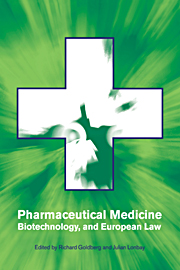Book contents
- Frontmatter
- Contents
- Notes on the contributors
- Preface
- Foreword by Francis G. Jacobs
- Editors' note
- Table of cases
- Table of treaties, European legislative instruments and national legislation
- Introduction
- Part I Free movement of goods and persons, competition and intellectual property
- 1 The free movement of goods I: pharmaceuticals, patents and parallel trade
- 2 The free movement of goods II: pharmaceuticals, trade marks and parallel imports
- 3 The free movement of health care professionals in the European Community
- 4 EC competition law, pharmaceuticals and intellectual property: recent developments
- Part II European drug regulation
- Part III Biotechnology
- Part IV Product liability and transnational health care litigation
- Index
3 - The free movement of health care professionals in the European Community
from Part I - Free movement of goods and persons, competition and intellectual property
Published online by Cambridge University Press: 24 October 2009
- Frontmatter
- Contents
- Notes on the contributors
- Preface
- Foreword by Francis G. Jacobs
- Editors' note
- Table of cases
- Table of treaties, European legislative instruments and national legislation
- Introduction
- Part I Free movement of goods and persons, competition and intellectual property
- 1 The free movement of goods I: pharmaceuticals, patents and parallel trade
- 2 The free movement of goods II: pharmaceuticals, trade marks and parallel imports
- 3 The free movement of health care professionals in the European Community
- 4 EC competition law, pharmaceuticals and intellectual property: recent developments
- Part II European drug regulation
- Part III Biotechnology
- Part IV Product liability and transnational health care litigation
- Index
Summary
Introduction
Health care professionals across the EU prescribe and administer medicinal products every day. As this is a critical task they are closely regulated and must be fully qualified in order to do so. This chapter seeks to explain the development of European Community law (hereafter EC or Community law) and policy as it attempts to tackle difficulties arising for free movement of individuals involved in the health care sector. The difficulties are caused by differences in structures of the relevant professions, differences in the modes of provision of health care4 that are found in the fifteen Member States of the European Community (EC), as well as the limited competence of the EC to act in this area. After examining these issues the chapter sets out the methods used to liberate health care professionals and their patients from national boundaries. The application of internal market rules to health care activities is examined and the sectoral and general Directives on recognition of qualifications are analysed. The gaps left by these instruments are exposed in the context of the current revisions and case law of the Court of Justice of the European Communities (ECJ).
Regulation of professionals
The medical profession, in common with many other health care professions, has long been regulated both by the State and as a matter of self-regulation. The two prime motives of State control are to ensure the safety of the final consumers (patients) and to control the costs involved, as the State is heavily involved in paying them. As we shall see, the European Community has a strictly limited role in relation to the provision of health care, which remains primarily a national responsibility.
- Type
- Chapter
- Information
- Pharmaceutical Medicine, Biotechnology and European Law , pp. 45 - 75Publisher: Cambridge University PressPrint publication year: 2001
- 1
- Cited by



